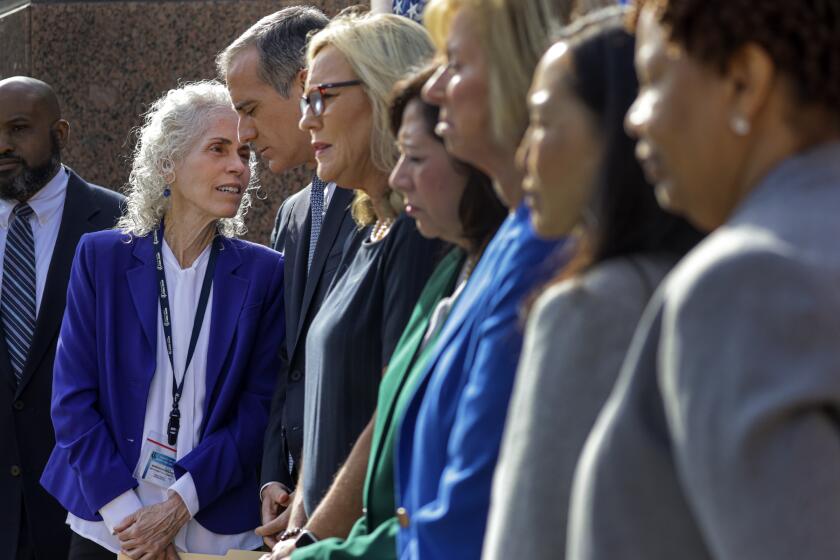In Hollywood and around L.A., COVID-19 is bringing out our inner heroes
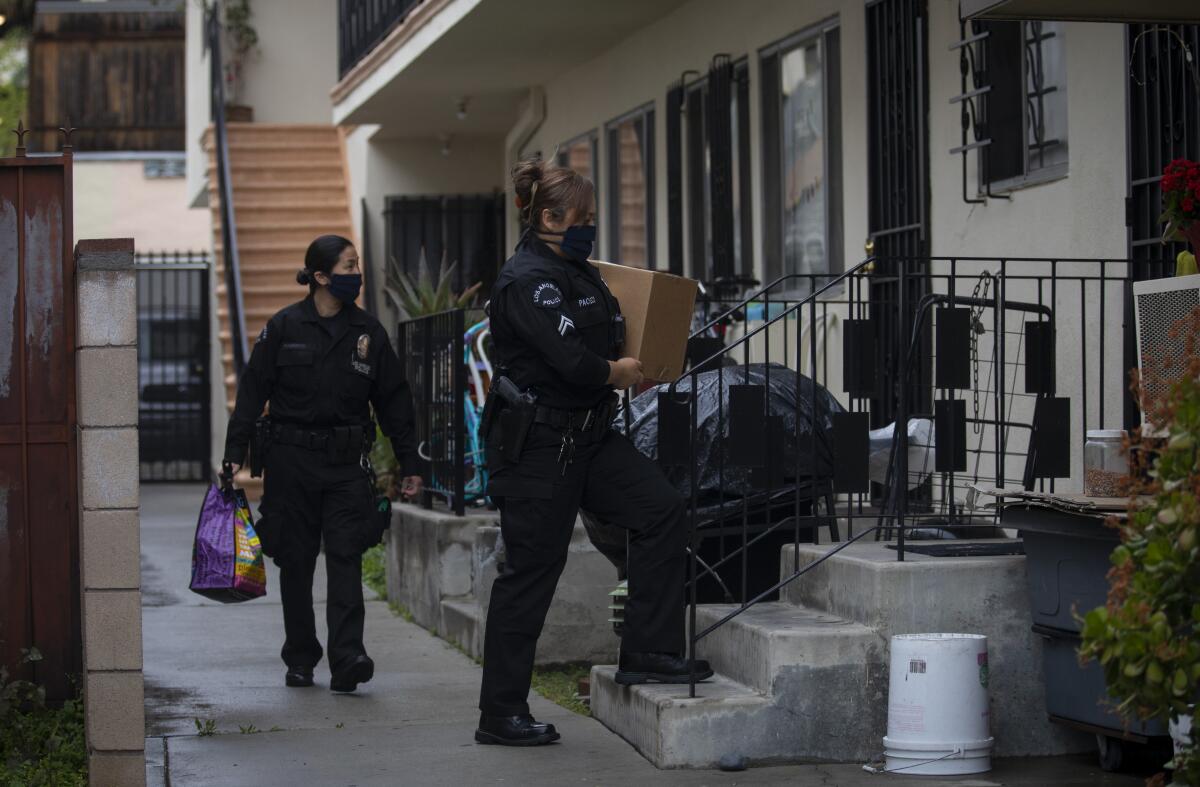
- Share via
At 10:45 Thursday morning in Hollywood, an LAPD van rolled to a stop in front of an apartment building on Camerford Avenue. Two officers wearing masks got out and knocked on the door of Unit #1.
“I’m Officer Piamonte and this is Officer Pacheco,” Kat Piamonte said. “We have groceries for you.”
“Thank you, thank you,” said the resident, Donata Ek, who was joined on the porch by Bartolome Basto.
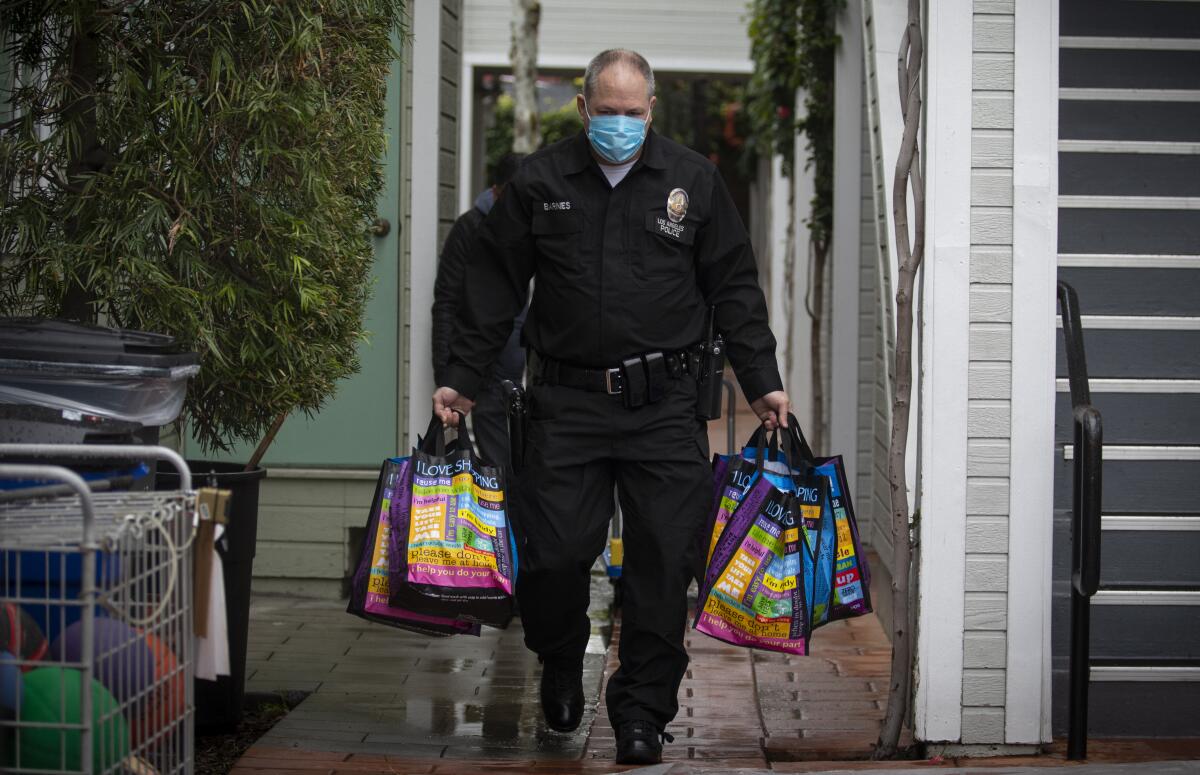
“Much appreciated,” a smiling Basto said.
The coronavirus outbreak has pummeled us, exposing our vulnerability and weakness. But it’s brought out the good in us too.
Need an example? Consider what happened when two members of the Central Hollywood Neighborhood Council — Louis Abramson and Ferris Wehbe— began cooking up ways to help their neighbors.
“As soon as the crisis hit, Ferris came to me like, ‘What can we do?’” said Abramson, an astrophysicist by trade.
It didn’t take long for them to agree that homebound seniors might need help with groceries. So they began scrolling through their constituent records to find the names and phone numbers of seniors living in the ZIP Codes of 90028 and 90038.
That wasn’t so hard to do, but the list was as long as the Capitol Records building is high. How would they check up on roughly 4,000 seniors?
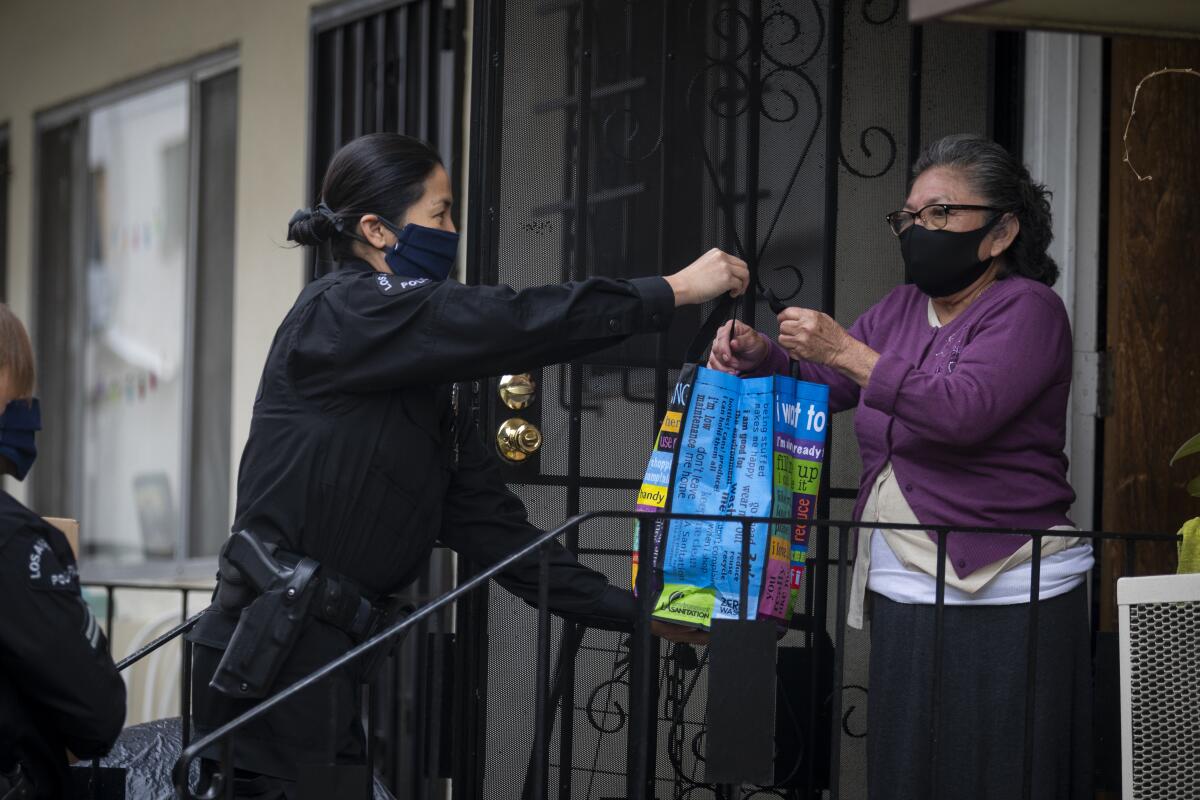
One thing that neighborhood councils have in abundance is connections. They have relationships with local elected officials, with police and fire, with local nonprofits and community groups. Abramson and Wehbe, who owns residential and commercial property in Hollywood, called all their contacts, and soon dozens of volunteers were making phone calls to seniors while others were lining up food sources.
“Hello brothers and sisters,” Wehbe wrote in an update to all parties involved Monday, which was Day 17 of the group’s COVID-19 mobilization effort.
By then, the L.A. Cedars Rotary Club had set up a donation site. Money and muscle were coming in from state Assemblyman Richard Bloom, L.A. County Supervisor Sheila Kuehl and L.A. City Councilmen Mitch O’Farrell and David Ryu, whose office had lined up food shipments from the Los Angeles Regional Food Bank.
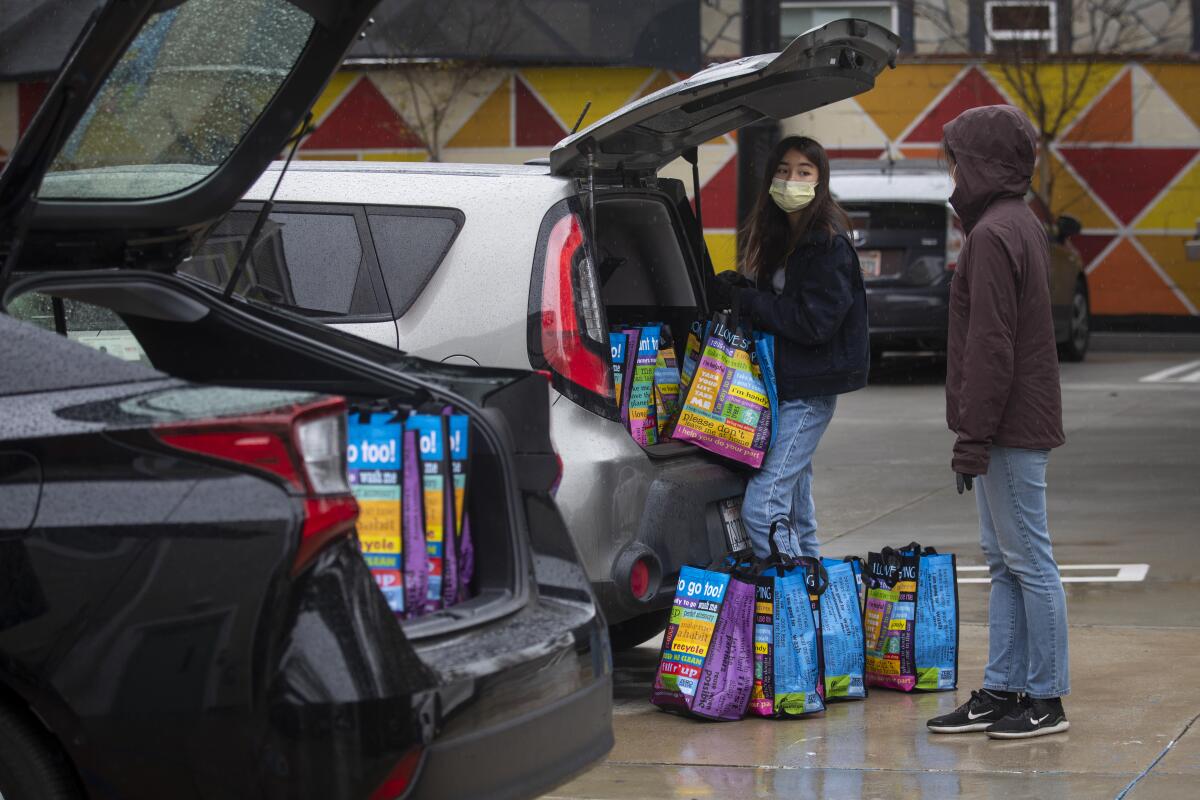
The Los Angeles Conservation Corps was making food pickups, and the L.A. Police Department signed on to deliver food. Hollywood Schoolhouse opened its shuttered gates to become the food distribution center.
Abramson set up video chat links for everyone and turned his computer into a command center, with spreadsheets and contact lists. As I was speaking to him by video conference, he was also manning a hotline and answering a call from a Spanish-speaking senior requesting help.
Dr. Barbara Ferrer announces coronavirus stats, warns us to keep our distance and dispenses compassion to a worried county.
“We’ll deliver to your home between 12 and 5 tomorrow,” he told her in Spanish after getting her address. Other languages spoken by the hotline volunteers are Russian, Armenian and Korean. The callers try to get a general sense of how seniors are faring, and whether they have friends or family to lean on, as well as whether they’re short on food.
It helped that Wehbe’s son-in-law, Spencer Hillman, had recently developed an app called KinderUS. He and his brother came up with it after caring for their disabled father from a distance and wishing there was a better way to connect those in need with those who want to help. The app was put to work, connecting Hollywood residents who needed groceries with those who volunteered to deliver them.
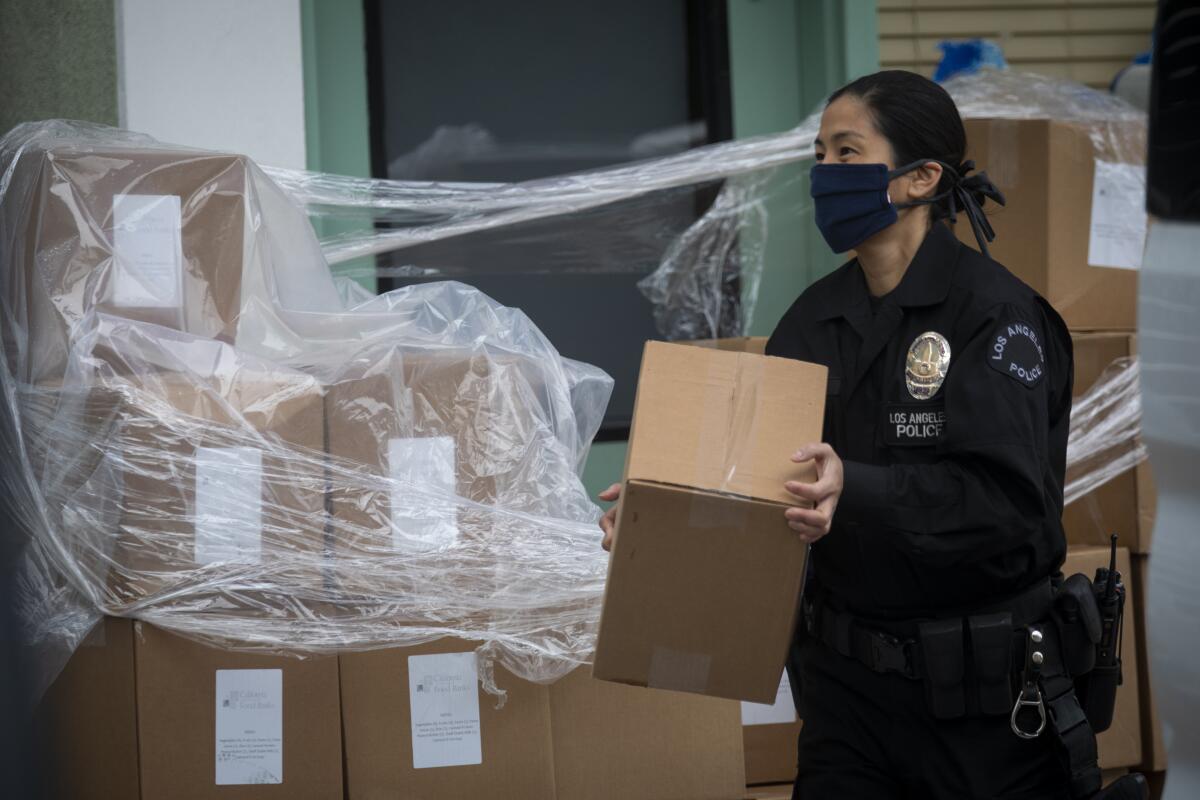
Gloves, masks and cash were donated by area residents. Mayor Eric Garcetti’s office provided reusable bags. Wehbe’s daughter, Laila, and other volunteers went to supermarkets and filled the bags with toilet paper, fresh produce and other items to supplement the Food Bank rations. Wehbe said other food sources are now being sought so volunteers don’t face an elevated risk from repeated visits to crowded stores.
In the first week, between 60 and 70 food deliveries were made. This past week, 240 more went out Thursday and an additional 40 or so on Friday, and the list of those signing up to receive or to deliver continued to grow.
“I had an amazing phone call when I needed it the most,” said a recipient named Joy. She told me she had just suffered a financial setback when, out of the blue, the phone rings and it’s someone asking if she could use a food delivery, no charge. “It’s just a horrible thing that’s going on in the world and it’s a beautiful thing to see people helping in so many ways.”
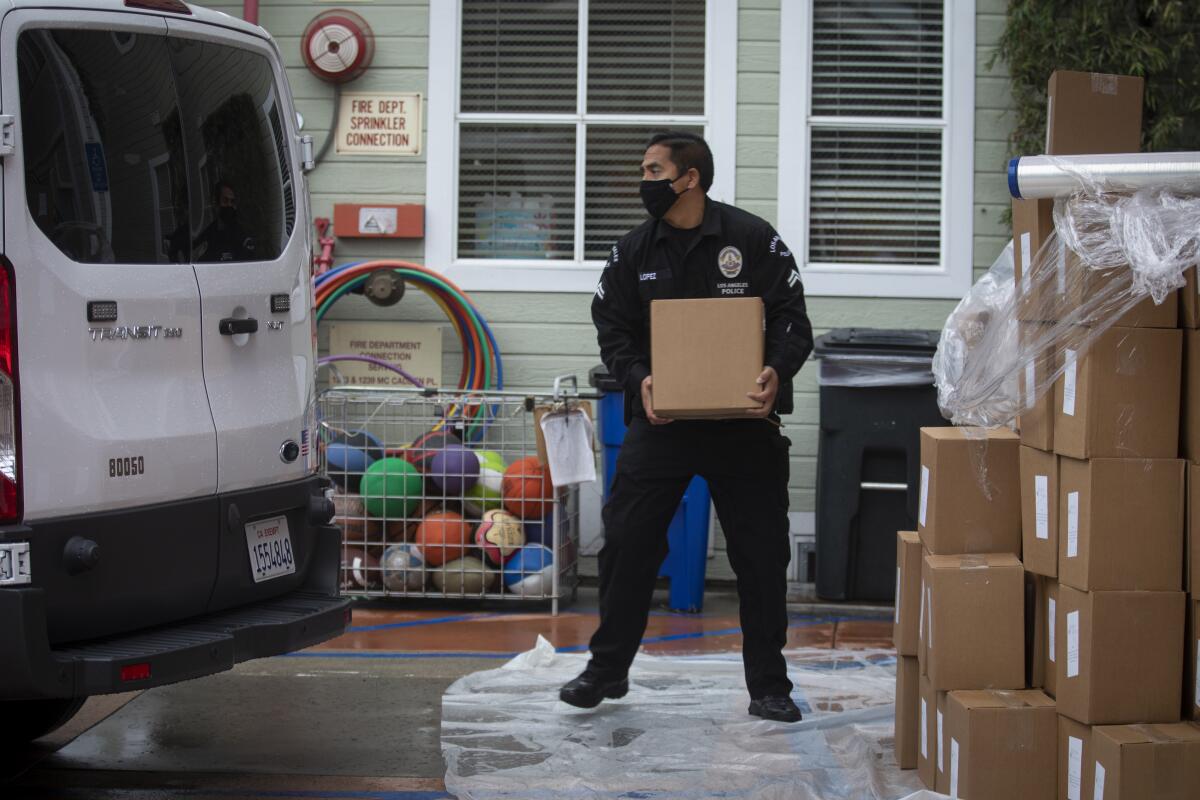
Thirteen-year LAPD Officer Anthony Lopez was one of four cops — along with Piamonte, Kirk Barnes and Marty Pacheco — who retrieved and delivered food Thursday. Lopez said crime was down during the stay-at-home order, so officers have more time on their hands than usual.
“People are very grateful because they love the fact that the police are coming out,” Lopez said. “And we love it because we’re helping our communities.”
At Hollywood Schoolhouse, a stream of masked-and-gloved volunteers braved the rain as they dropped by to grab and deliver groceries. Min Kim and her cousin, Soo Kim, who was with her daughter, Dylan, packed dozens of boxes and bags into their cars. Soo said her cousin knew about the deliveries and recruited her, and she didn’t hesitate.
“You have people who are in need,” Soo Kim said, telling me she had considered the risk involved but decided it was no riskier than going to the supermarket.
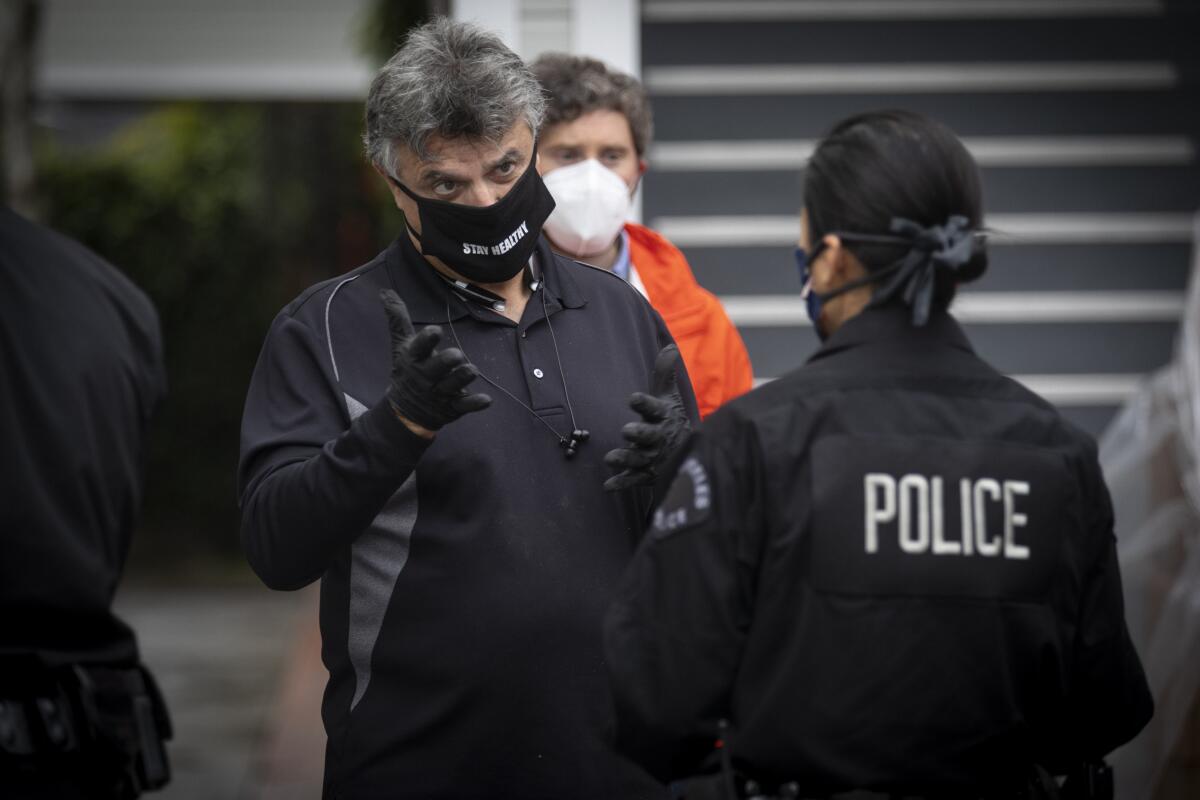
The county began offering food deliveries to homebound seniors a few days ago, but recipients have to pay in advance. Abramson said his group’s focus will remain on needy recipients, but so far income information isn’t being requested of them.
“My impression is that a very sizable number of them are truly needy, and almost everyone is scared to go out,” he said.
Among the people reached by phone, Abramson said, several turned out to be homeless, including two men who live in a car, both of them with AIDS.
“The only reason we’ve been able to do this so quickly is that we were able to throw a lot of the rules out the window,” Wehbe said. “We’re not acting as a neighborhood council; we’re acting as a COVID-19 response team.”
There’s still collaboration, but not the usual rules of governance.
“If you had to wait to have a meeting approved, we’d be whistling Dixie right now. Sometimes in an emergency, you have to say, ‘You know what, let’s get out there together and make a difference,’” Wehbe said. “I’m very proud, and it brings tears to my eyes.”
It’s not clear how long the crusaders will be able to sustain such a massive undertaking, but Abramson said other neighborhood groups in the city have reached out for advice on setting up the same infrastructure. And he thinks there’s a lesson in how government, neighborhood groups and individuals can work together more efficiently in the future to identify and address community needs.
And the Hollywood model isn’t the only way people are trying to make a difference in tough times.
Compton’s Shirley Raines, featured in a Times story by Julissa James, has led volunteers on missions to skid row, delivering care packages.
Friends of West L.A., which bought hundreds of towels for homeless people who were relocated to rec centers, is now gathering and delivering meals to UCLA’s emergency room staff and to police and firefighters, a mission to help both struggling restaurants and first responders. On Thursday the cargo was short rib tacos, restaurants were on board and donations were rolling in.
And there are hundreds more examples of people stepping up.
As for Abramson and the Hollywood effort he helped launch, he feels grateful to be doing what he’s doing. “I’m absurdly privileged to get paid to stare into space,” said Abramson, a fellow with the Carnegie Observatories. “Now I get to take off from my staring-at-space duties and think about more terrestrial matters…. This is my job right now.”
steve.lopez@latimes.com
More to Read
Sign up for Essential California
The most important California stories and recommendations in your inbox every morning.
You may occasionally receive promotional content from the Los Angeles Times.

